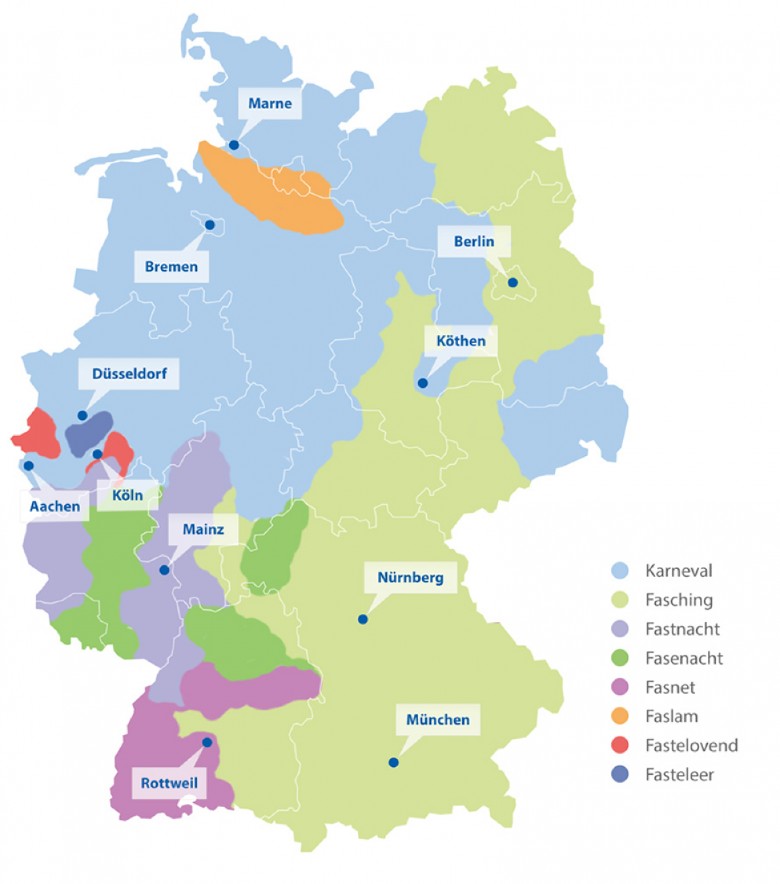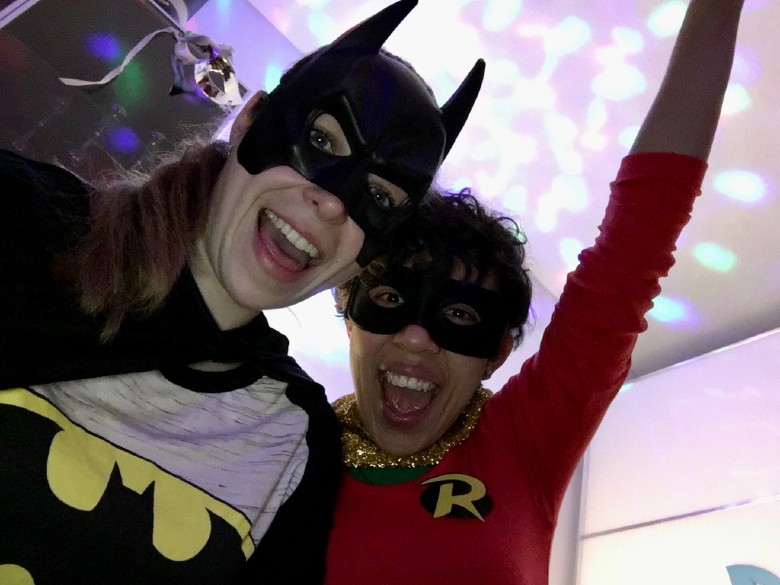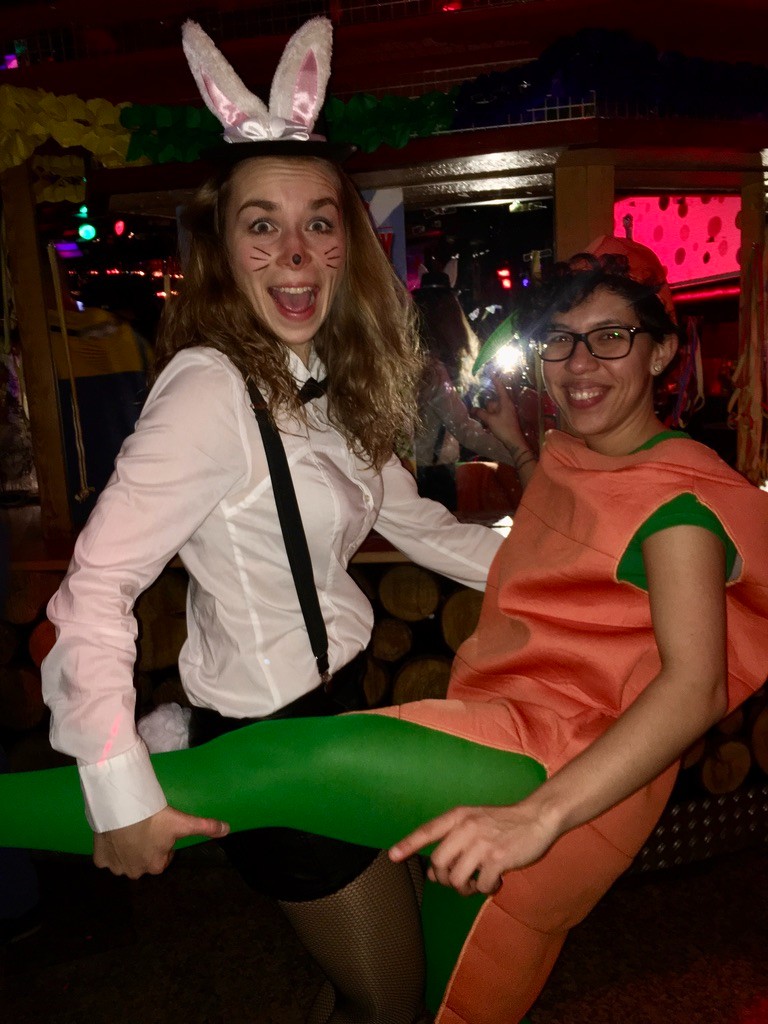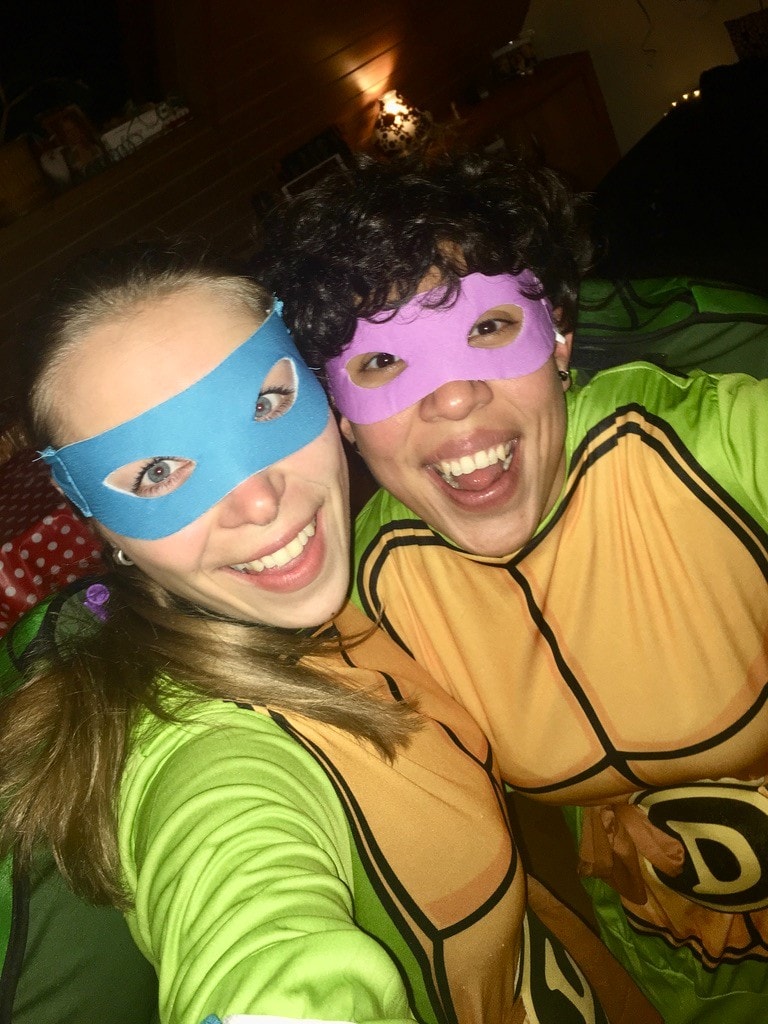Carnival in Germany might come as a big surprise to some. It sure was for me! Whether you are visiting or living in a popular carnival region, your mind will be blown by how big this festivity is in Germany!
Some regions of Germany call carnival ‘the fifth season’ of the year. The biggest carnival celebration is in Cologne, where over 1 million people, both locals, and visitors, come together to celebrate this time.
If you want to learn the details of this colorful, crazy, and joyful celebration in Germany, make sure to keep on reading.
What is carnival in Germany?
Carnival in Germany is the time of year where Germans are allowed to lose control. There is an excess of parades, costumes, parties, balls, music, and beer during this time. In some cities, this celebration is the biggest of the year. It trumps Halloween, Christmas, or New Year’s.
Germans love rules, so it does not come as a surprise to find that there is also a rule which allows Germans to go wild 😆.
Depending on the region you are in, you might not notice people celebrating carnival at all. In Berlin, for example, you need to look hard for carnival celebrations, as they are not known to many.
In other regions, like in the Rheinland, carnival plays a significant role in the culture, so you would have to be living under a rock to not notice this season.
Who celebrates carnival in Germany?
Every region in Germany celebrates carnival one way or the other. Depending on the area you live in, you might hear different names for this season. The three most common names for carnival in Germany are Karneval, Fastnacht, and Fasching. Some might use a more local name. For example, in Cologne, Karneval is called Fastelovend colloquially.

Cologne has the biggest carnival celebration in Germany, followed by Dusseldorf and Mainz. The celebrations in these big cities and all over the Rheinland are full of colorful costumes, a lot of alcohol, joyful songs, and crazy parties.
Not all of Germany, however, celebrates carnival with ‘out of control parties’. For example, in the south, the towns close to the Black Forest celebrate carnival more traditionally. They use this time to reflect on the simple life and to keep old traditions alive.
In the video below, you can see how similar the carnival celebration is between Cologne and Mainz and how different they are from a town in the south of Germany.
Why is carnival such a crazy time for Germans?
Carnival, as many European traditions, has religious roots. It is the last chance to get wild before Lent. Lent is a Catholic season of 40 days where believers reflect and prepare for Easter. Some Catholics will stop doing some things during these 40 days, like not eating sweets or meat and not drinking alcohol.
Although the origins of carnival have a religious background, most Germans who celebrate it are not religious. So at the end of the day, it’s just an excuse to party and sing, really 😅.
What is the origin of carnival in Germany?
The most popular theory about the origins of carnival in Germany goes back to pagan times. Before Catholicism arrived in Germany, there were multiple spring festivals to celebrate the end of winter.
Some festivities would require people to wear scary masks to drive out the evil spirits and welcome a good crop season. Others, like the people along the Rhine, would have a festival in honor of their wine god Dionysus. Needless to say, these celebrations involved a lot of wine and laughter.
When Christianity arrived in Germany, the Catholic church saw these festivities as a perfect celebration before Lent. So they introduced the term carnival, which has Latin roots (Carne Vale), which means ‘good-bye meat’.
As years went by, carnival was seen as the perfect ‘last party’ before Lent’s regulations would kick in. During this period, there was a sense of equality of classes. Poor and rich people were able to mix. It was easy to do it because everyone used imaginative masks and costumes to hide their identity.
The common people would also mock the political authorities through humorous and satirical speeches. These performances were also done with costumes and masks to avoid the participants being recognized and later punished by the authorities.
The carnival celebrated in Germany today is a mix of all of these things: a celebration before Lent with a lot of alcohol, funny costumes, and satirical speeches and parades.
When is carnival in Germany?
The carnival season in Germany, a.k.a. ‘The Fifth season of the year’, starts on November 11th at 11:11, and it finishes at 23:59 on the day before Ash Wednesday.
Even though Ash Wednesday falls on a different date every year, carnival season always starts on 11.11 at 11:11.
In the following video, you can see the countdown for carnival season to begin in Cologne.
Not every city celebrates the start of carnival like Cologne does. It’s mainly the Rheinland and Mainz who are famous for this type of celebration.
After the inauguration of November 11th, it might appear as nothing else happens until six days before Ash Wednesday.
Carnival is an old tradition in Germany. As an expat or tourist, you might just notice the big parties on November 11th and the Carnival week before Ash Wednesday.
In between the big parties, however, there are tons of smaller and more traditional events happening in all the villages that celebrate carnival. Germans love to have associations for everything, and it should not come as a surprise that there are also Carnival Associations who regulate the events.
These associations plan the carnival season before it starts. They have official meetings where they vote on a motto for the year, pick the season’s song, and elect a Carnival Prince, Peasant, and Damsel.
If you are not part of any of these Carnival Associations, which if you are reading this, most likely you are not, don’t worry as you can still join the carnival festivities on the most popular dates.
What are the important dates for carnival in Germany?
November 11th
This day marks the beginning of carnival season at 11:11 am. Cologne has the best celebration on this day. People take the day off to attend the inauguration ceremony, which is open-air and held in the city’s second-biggest plaza called Heumarkt.
People arrive very early to be able to get a place close to the stage. After the inauguration is over, everyone stays on the street or goes to pubs to keep the party going.
Fat Thursday – Weiberfastnacht
The next big party starts six days before Ash Wednesday. Sometimes, Fat Thursday can be two or three months away from November 11th.
Weiberfastnacht, which means Women’s Carnival, also starts at 11:11 on Fat Thursday. Usually, women are allowed to take over the municipality for a day and cut the ties of the men working there in exchange for a kiss. This celebration also marks the beginning of the street carnival.
After the ceremony concludes, the celebration continues on the street. Most of the pubs have bars and speakers outside. Women continue to cut men’s ties throughout the day, and it is very common for people to kiss each other without any warning.
Carnival weekend
Smaller celebrations continue to happen during the Friday, Saturday, and Sunday before Ash Wednesday.
Parties on Friday and Saturday are usually during the evening. On Sunday, street parties starting in the morning are very common, along with smaller parades in the city’s different neighborhoods.



Monday – Rosenmontag
Rosenmontag, which means Rose Monday, is the big ending of carnival season for most. It is on Rosenmontag, where the big cities have a parade that starts in the morning. The parade is filled with highly imaginative floats. The floats’ mottos can be anything, really. However, it is very common to see satirical ones mocking the German government and other governments like the one from the USA.
During the parade, each float has lively music and throws candies and other goodies (called Kamelle) to the people watching on the sidelines. It is a very popular sport to catch candies during this parade. Yup, you read that right, it is a sport to catch some sweets without others stealing them from you.
Shrove Tuesday
While most of the people who participated in the carnival celebration might be recovering from a brutal hangover on this day, others will attend one last celebration.
On this day, a straw doll is burned in the evening in front of different locations, usually pubs. Each region has a different name for this doll. For example, in Cologne, it is called the Nubbel, while in Dusseldorf, it is the Hoppeditz.
Legend says that whatever someone does during the carnival season has been influenced by this evil doll. The popular belief is that by burning it, all the sins from the carnival season are forgiven.
As the saying goes, what happens in carnival, stays in carnival.
5 things to know to celebrate carnival in Germany like a local
If you plan to celebrate carnival in the big cities like Cologne or Dusseldorf, here are some tips for you.
1. Use the correct carnival call
Each region has different “fools’ calls”, which are yelled during carnival season. In the area of Cologne / Bonn, the popular carnival cry is ‘Alaaf’. While in the areas close to Dusseldorf, it is ‘Helau’. Be very careful not to confuse these two, as the locals might give you some horrible stares if you do as there is a long standing rivalry between the two regions.
2. You have to wear a costume
If you plan to attend any party, whether at a bar, club, house or on the street, you have to wear a costume. You will be mocked a lot if you show up without any costume. Costumes during carnival are very joyful and funny, so also be careful not to show up with your scary Halloween costume.
3. You will be impressed by the costumes
Whether you participate in a carnival party or not, you will for sure see some people with amazing (or sometimes not so much) costumes. It is not so uncommon that as you are dozing off on your commute to work, a full-grown man dressed as a princess might walk into the train all nonchalant.
4. There is a lot of singing
Each region has its local carnival songs, which are played over and over and over again at any party you might attend. The lyrics are either in the regional dialect or in Standard German and mostly talk about the region from where the song comes from. The music is intended to include the crowds to sing along, sway or dance. The lyrics tend to be very easy to sing along, as it involves a lot of repetitive and simple chants.
5. Expect to see many drunk people
As explained in this article, carnival is a time to get wild. People of all ages drink a lot during this time. It doesn’t matter the time of day. I have seen groups of people who are well above 60 years old and completely tipsy at 10 am on the streets dressed as clowns.
I hope you enjoyed this article and have the chance to one day join some German Karneval celebrations. Helau / Alaaf!
Continue Reading
Take a look at our Germany 101 section for more informative guides on how things work in Germany.





